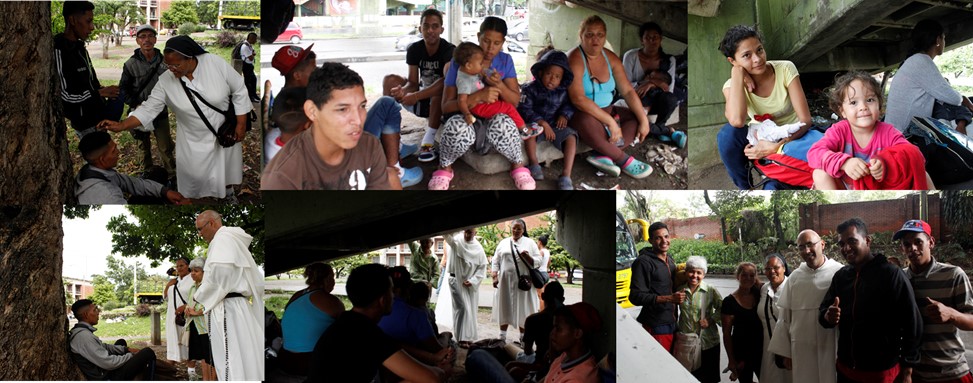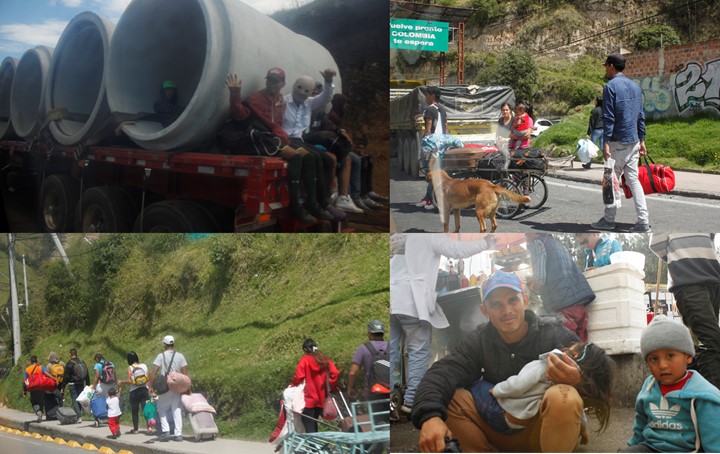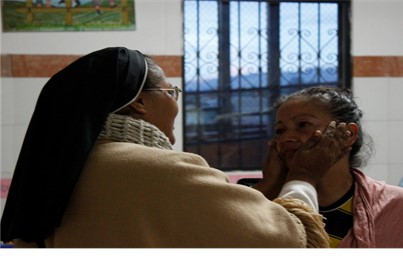Caracas (Venezuela), 06/19/2021, Sr. Nícida Amparo Díaz Leal.- They could not find a place to lay their heads; this is the daily tragedy of the refugees. In this reflection, I would like to dwell on the dynamic of see, judge and act, because it allows us to better understand the subject and helps us to be aware of our commitment to a service of fraternal charity with our brothers and sisters who are refugees.

What do we see in refugees?
Men, women, children, youth, adolescents, older adults, families, etc., who flee from their country of origin because of war, violence and persecution; they flee because they do not have work, they are hungry, they do not have the minimum conditions to live with dignity. They are afraid because their lives and the lives of their loved ones are in danger. Therefore, they leave their home land seeking protection in another country. They flee in the midst of uncertainty, they know they are leaving their country, they escape with hope, they leave risking everything, but when they arrive at their destination, they do not find a place to lay their heads, because they are rejected, they are denied, they are discriminated and yet there is always a light that shines on the way. There are those people who become neighbors, who go out to meet them, nourish and sustain their hope. They go out to meet with hopeful gestures, both human and divine gestures that help their burden to be light and their steps forward will be safe and confident.
How can we approach this drama of life so that it will help us to understand the reality?

Let us approach it from God's perspective. As Christian women consecrated to God of life in the Charism of Marie Poussepin, we cannot be indifferent to them. We are called to discover in each refugee a theological presence, that place where God makes Himself present and asks us to listen to his cry and contemplate his hidden face. "In each of these people, forced to flee to safety, Jesus is present as he was at the time of Herod…we are called to see the face of Christ who pleads with us to help (cf. Mt 25:31- 46)” [1].
Let us also approach it from the perspective of our Charism that always seeks to welcome Christ in each person and serve the imprisoned Christ in Charity in the faces of the hungry, the thirsty, the naked, the sick and the strangers. A service that seeks to "proclaim Jesus Christ" with our way of being and being among them. This reality "urges us to commit ourselves in the struggle for human dignity and the complete liberation, in Christ, of the poorest of our brothers and sisters." (C 86).
We consider it as a sign of our times, where the Holy Spirit is working to help us To determine apostolic priorities, we shall endeavor to discover and to understand the values and the problems of the world, and the deep yearnings of our brothers and sisters (Cf. C 86).
And what does our actions do?
 The reality of refugees becomes for us a call to de-learn what is already learned, established and programmed, to learn to be available to this existential periphery of those who walk crossing through our path, tired, wounded, beaten, thirsty and hungry for fraternal and supportive gestures and stretch out their arms to embrace them with the tenderness and compassion that we carry within us.
The reality of refugees becomes for us a call to de-learn what is already learned, established and programmed, to learn to be available to this existential periphery of those who walk crossing through our path, tired, wounded, beaten, thirsty and hungry for fraternal and supportive gestures and stretch out their arms to embrace them with the tenderness and compassion that we carry within us.
In the midst of this reality, we listen to the voice of God who tells us "Comfort, comfort my people...speak to their hearts" (Isaiah 40, 1-2) ...listening to them we can meet them "not superficial, cloying words, therefore, but mercy and deep-seated concern, an embrace giving strength and patient accompaniment in the rediscovery of faithful pathways." (Rejoice p. 36).
We accompany them as Jesus accompanied the disciples of Emmaus, as he accompanied the primitive community after his Resurrection, helping them to understand the new reality that they were living. We welcome them as Martha and Mary welcomed Jesus in Bethany; we protect them as Joseph did with Mary and the child Jesus when they fled to Egypt; we promote them in their dignity as persons, beloved children of God, protagonists of their personal history?
Refugees are the hidden face of Christ who has nowhere to lay their head...Our commitment to them is to offer our shoulder and extend our arms, without aversion, without fear and tell them that today, tomorrow and always they will find a place to lay their head...a sign of Charity inherited from Marie Poussepin and continued in each sister throughout history in the daily expression of our Charism.
[1] Pope Francis, Message for the 106th World Day of Migrants and Refugees, 2020.


 EN
EN  ES
ES  FR
FR 



